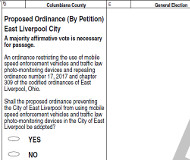Article from: www.thenewspaper.com/news/68/6807.asp
10/4/2019
Ohio Courts Could Block Public From Voting On Speed Cameras
Local judge to decide whether to intervene in election to protect speed cameras in East Liverpool, Ohio.
 Ohio voters have spoken clearly in opposition to the use of speed cameras and red light cameras over the past decade. Out of eleven times in which the use of automated enforcement was a ballot issue in the state, cameras only won once. Columbiana County Common Pleas Judge Scott A. Washam could decide on Friday whether he will personally intervene in a local election to protect the speed cameras from the verdict of East Liverpool's residents.
Ohio voters have spoken clearly in opposition to the use of speed cameras and red light cameras over the past decade. Out of eleven times in which the use of automated enforcement was a ballot issue in the state, cameras only won once. Columbiana County Common Pleas Judge Scott A. Washam could decide on Friday whether he will personally intervene in a local election to protect the speed cameras from the verdict of East Liverpool's residents.
The city of over 10,000 has already printed ballots for the November 5 election asking the question, "Shall the proposed ordinance preventing the city of East Liverpool from using mobile speed enforcement vehicles and traffic law photo-monitoring devices in the city of East Liverpool be adopted?" The mayor is asking the court to shred those ballots and print a fresh batch without any mention of a referendum on the devices that generate $1 million in annual revenue for the city.
East Liverpool residents successfully gathered the number of signatures required to put the matter to a public vote two years ago, but the city refused to allow a vote because the proposed referendum contained a technical error. The ballot measure sought to cancel the previous speed camera legislation -- Ordinance Number 53 -- instead of Ordinance Number 17. The city changed the ordinance numbers a few months before the petition was filed. The initiative proponents sued for a chance to correct the text of the ordinance, but the appellate court last month rejected that idea.
"In this case, Citizens' initiative petitions did not merely involve a de minimus error or a slight misstatement," Judge David A. D'Apolito wrote for the panel. "Rather, the wrong legislation was cited."
It falls to Judge Washam to decide whether the appellate court's decision empowers him to intervene to block the public vote, or to allow the electoral process to play out. Texas courts have considered the question, and they decided in favor of allowing such votes to proceed, saying it was impossible to show "irreparable harm" in allowing a vote because there is no way to pre-judge whether the cameras would win or lose at the ballot box. View the Houston case, the Arlington case and the Cleveland case. The California Court of Appeal in 2014 upheld what it called the constitutional right of Murrieta voters to decide on the red light camera issue at the ballot box (view case). Likewise, the Fifth Circuit US Court of Appeals in 2012 sided with residents over the "well funded and longstanding opposition of the mayor and city council" (view case).
So far, the residents of Ashtabula, Cleveland, Chillicothe, Heath, Garfield Heights, Maple Heights, South Euclid and Steubenville have voted to outlaw automated ticketing machines. A copy of the Ohio Court of Appeals decision is available in a 300k PDF file at the source link below.
Source: East Liverpool Citizens v. East Liverpool, Ohio (Court of Appeals, State of Ohio, 9/19/2019)
Permanent Link for this item
Return to Front Page
 Ohio voters have spoken clearly in opposition to the use of speed cameras and red light cameras over the past decade. Out of eleven times in which the use of automated enforcement was a ballot issue in the state, cameras only won once. Columbiana County Common Pleas Judge Scott A. Washam could decide on Friday whether he will personally intervene in a local election to protect the speed cameras from the verdict of East Liverpool's residents.
Ohio voters have spoken clearly in opposition to the use of speed cameras and red light cameras over the past decade. Out of eleven times in which the use of automated enforcement was a ballot issue in the state, cameras only won once. Columbiana County Common Pleas Judge Scott A. Washam could decide on Friday whether he will personally intervene in a local election to protect the speed cameras from the verdict of East Liverpool's residents.